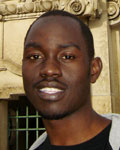![[Executive Check] Photojournalism remains a costly affair in Uganda - FCAU](https://biz-file.com/c/1207/109187.jpg)
Malcolm Webb: FCAU decided to organise the Uganda Press Photo Award to promote and celebrate Ugandan photojournalism. We want to bring attention and reward to the many talented photojournalists in Uganda, and share some of FCAU's access to people who can help do that. The awards will bring photojournalists' work to the attention of senior regional photo editors, who are the judges.
The awards have already attracted substantial sponsorship in the form of prizes. In addition, the awards event will provide a great networking opportunity for FCAU members and Ugandan photojournalists to meet each other and exchange ideas.
![[Executive Check] Photojournalism remains a costly affair in Uganda - FCAU](https://biz-file.com/c/1207/109188.jpg)
Webb: We hope this will become an annual event, and grow from strength to strength. We also talked about the possibility of organising awards for other forms of journalism, but for now we are starting with a photojournalism award.
Webb: The cost and availability of good equipment is a major hurdle, although as equipment prices steadily come down, amateur or professional photojournalism is open to more and more people.
Also the relatively low fees paid by publications for images make it difficult for photojournalists to buy equipment and fund projects. Yet, journalists in Uganda and those abroad buy equipment at relatively similar costs.
It also costs a lot of money to carry out assignments and fund travel to events. Many publications in Uganda also do not have adequate budgets for travel expenses, so that can make it difficult for photojournalists to do assignments in remote areas, or away from their home town.
Webb: FCAU is a professional association for journalists, both Ugandan and foreign, who work in Uganda for foreign news outlets. Our role is largely that of a networking organisation, holding meetings and social events. We represent our members' professional interests, and so if a member's security is under any kind of threat, related to work, we take whatever steps we can to keep them safe, or to prevent future incidents. We cannot claim to legitimately represent non-members, and neither are we a political or campaigning organisation.
Webb: While what happens within newsrooms is beyond the control of FCAU or the Uganda Press Photo Award, the award will bring recognition to what the judges decide to be the best images taken in Uganda, in the last year, and to the people who took them.
Webb: The international press agencies all hire freelance Ugandan photojournalists. On top of that, more and more opportunities for photojournalists are opening through the internet and social networking websites.
As connection speeds increase, and internet costs decrease, I think a more level playing field is slowly but steadily opening for photojournalists worldwide, and for anybody who produces creative content. It opens a door for any individual to potentially build an international reputation for themselves and their work, which was previously the domain of an elite few.
Webb: I think those photojournalists with an online presence really benefit from it. One of FCAU's members, Edward Echwalu, runs a photo blog (echwaluphotography.wordpress.com) that has thousands of followers from all over the world. As he writes himself, many of them do not even know where Uganda is, but they appreciate his work.
Edward was recently nominated for a CNN African Journalist Award. I'm not an authority on photojournalism so I cannot advise Ugandan journalists on what to do but I can share with you contacts of colleagues who can authoritatively comment on that.
